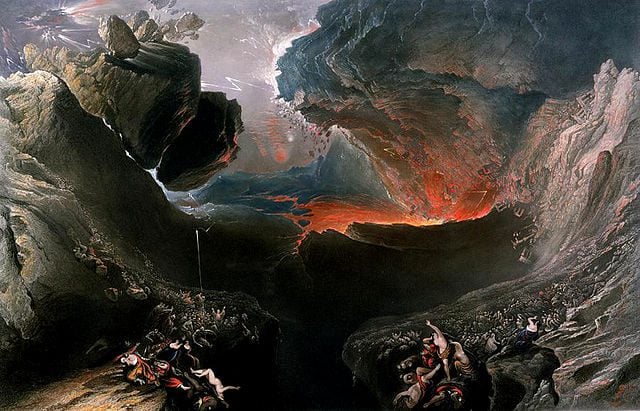
How can God judge entire nations, including young children?
* * * * *
God as Creator and judge has the prerogative to judge and take any human life as He wills. He could kill all of us and it would be perfectly just, since we are all sinners and saved only by His grace and mercy if we are at all.
It is not ever “intrinsically evil” for God to judge individuals or nations; it’s not “evil” at all, because, as Creator, God has the prerogative to give life or take it away.
In instances of judgment of entire nations, obviously there will be many people relatively innocent (in terms of actual sin, but not original), compared to others. Yet God still can make such a command and it is perfectly moral, because all men are sinners (if one accepts original sin). Whoever denies this must also deny some orthodox teaching of the faith or some key doctrine in the Bible, such as original sin, or the attributes of God.
The biblical Christian (Catholic, Orthodox, and Protestant alike) must accept these two premises:
A) God as Creator and Judge has the prerogative to judge and take any human life.
B) Mankind as a whole is in a condition or state of rebellion against God, due to original sin; therefore God is perfectly just if He kills any one of us. He is not “obliged” to show mercy to anyone anymore than a governor must pardon every criminal in a prison.
Everyone conceived is guilty of original sin. Original sin is every bit as real as actual sin. It is a corporate sense of human rebellion against God. It’s explicitly grounded in biblical teaching. We all participated in the fall and the rebellion against God.
Everyone is responsible for his or her original sin, as part of the human race. Sin cannot be regarded as only an individual affair, and only applicable after the age of reason. It is also a corporate affair: the rebellion of the human race against God. See my treatment of the relevant biblical data: “The Biblical Evidence for Original Sin“.
If something is intrinsically evil, then no one can do it, even God. The eternal rewards which await anyone who is judged by God, dies and is saved, are also relevant and a factor to be considered, according to the principle elucidated by St. Paul:
Romans 8:18 (RSV) I consider that the sufferings of the present time are not worth comparing with the glory that is to be revealed to us.
I’m not claiming that God would condemn someone eternally based on original sin alone. This is incorrect. What I’m contending is that God has the prerogative to kill anyone, and that anyone killed is not perfectly innocent (because of original sin), only relatively more or less so, and that God is not guilty of an intrinsically evil act in so doing. I think that holds regardless of how exactly one relates actual sin to original.
My philosophy student friend stated that CCC 404 and 405 justified putting “sin” in quotation marks. But then what to do with CCC 403?:
Following St. Paul, the Church has always taught that the overwhelming misery which oppresses men and their inclination towards evil and death cannot be understood apart from their connection with Adam’s sin and the fact that he has transmitted to us a sin with which we are all born afflicted, a sin which is the “death of the soul”. Because of this certainty of faith, the Church baptizes for the remission of sins even tiny infants who have not committed personal sin.
If this sin is not “really” sin, then what sin is remitted by baptism? Why do we baptize infants? Obviously, then, there is a real sin other than personal sin, of which even infants are guilty, which is why we baptize them. If this sin weren’t real, then baptismal regeneration is a false doctrine too.
Following this through to its logical end would mean the heresy of Pelagianism, which states that man can make the first steps toward God and salvation. But the Church teaches that this is impossible without God’s grace.
If man on his own cannot attain even the first baby step towards salvation without God’s supernatural help, he is already in a state of rebellion towards God. Therefore, it cannot possibly be unjust or “evil” for God to judge any individual person by killing (not necessarily eternal damnation, which is determined by additional factors). God is under no “obligation” to make positively certain that any man will live longer than he does. He has the power over life and death. He “giveth and taketh away.”
Also relevant is CCC 418:
As a result of original sin, human nature is weakened in its powers, subject to ignorance, suffering and the domination of death, and inclined to sin (this inclination is called “concupiscence”).
If the soul is already subject to the domination of death (cf. similar language in #405), then God cannot be blamed for bringing about a death in any such soul, at whatever age, as if this were evil, when each and every soul (except for Mary, and that due to a special preventive grace) is already subject to death by virtue of original sin.
Baptismal regeneration applies to infants below the “age of reason.” If an infant can be saved through baptism (CCC 846, 1257, 1277), what is he or she being saved from? Obviously, “real” sin. And, obviously, original sin, since actual sin is not in the picture yet. And this is real, true sin, because the effects of baptism are equally real and of immense significance. The Council of Trent’s Decree on Original Sin makes this clear:
[E]ven infants, who could not as yet commit any sin of themselves. are for this cause truly baptized for the remission of sins, that in them that may be cleansed away by regeneration which they have contracted by generation. (4)
The next section of the decree (5) refers to original sin as “that which has the true and proper nature of sin.” It is the remaining concupiscence which is not sin proper, but original sin is. The CCC follows Trent in affirming that original sin is the “death of the soul.”
It also should be noted that all these decrees to exterminate nations that are often objected to by biblical skeptics and atheists and theological liberals, occurred during the Old Covenant, before baptism was given.
Therefore, God is not guilty of an intrinsic evil in commanding (in some instances) whole nations to be annihilated. After all, God killed many people by drowning in Noah’s flood. Was that unnecessary suffering and another possible evil act by God, because of what a person experiences when drowning? No; of course not.
Lastly, there is another argument I alluded to in my first response: that of “relatively innocent” people being killed in a general judgment of an entire nation. I wrote at length about this aspect in my paper: “The Judgment of Nations: Biblical Passages and Commentary” (+ Part Two) Here is an excerpt:
Nations are as contradictory as every human being is: we are mixtures of radical good and radical evil, due to original sin, the world, the flesh, and the devil. Alexander Solzhenitsyn correctly noted: “the line between good and evil runs through every human heart.” Nations are much the same. Many of the inhabitants of a country could be very righteous and perform many good works, but there is a common motif in the Old Testament, whereby God ceases to even acknowledge the goodness of spiritually or morally good, pious acts, if enough evil is tolerated that even the pious acts become overtly hypocritical:
Proverbs 28:9 If one turns away his ear from hearing the law, even his prayer is an abomination.
Isaiah 1:4, 11, 13, 15-17 Ah, sinful nation, a people laden with iniquity, offspring of evildoers, sons who deal corruptly! They have forsaken the LORD, they have despised the Holy One of Israel, they are utterly estranged . . . “What to me is the multitude of your sacrifices? says the LORD; I have had enough of burnt offerings of rams and the fat of fed beasts; I do not delight in the blood of bulls, or of lambs, or of he-goats . . . Bring no more vain offerings; incense is an abomination to me. New moon and sabbath and the calling of assemblies – I cannot endure iniquity and solemn assembly . . . When you spread out your hands in prayer, I will hide my eyes from you; even if you offer many prayers, I will not listen. Your hands are full of blood; wash and make yourselves clean. Take your evil deeds out of my sight! Stop doing wrong, learn to do right! Seek justice, encourage the oppressed. Defend the cause of the fatherless, plead the case of the widow.
Isaiah 5:20 Woe to those who call evil good, and good evil; Who put darkness for light, and light for darkness; Who put bitter for sweet, and sweet for bitter!
Isaiah 59:2 . . . your iniquities have made a separation between you and your God, and your sins have hid his face from you so that he does not hear.
Jeremiah 14:12 Though they fast, I will not hear their cry, and though they offer burnt offering and cereal offering, I will not accept them; but I will consume them by the sword, by famine, and by pestilence.
Amos 5:21-24 I hate, I despise your feasts, and I take no delight in your solemn assemblies. Even though you offer me your burnt offerings and cereal offerings, I will not accept them, and the peace offerings of your fatted beasts I will not look upon. Take away from me the noise of your songs; to the melody of your harps I will not listen. But let justice roll down like waters, and righteousness like an ever-flowing stream.
See also Matthew 23:1-31 (Jesus’ condemnation of the “pious hypocrisy” of the Pharisees).
In any such judgment of a nation, there will be differential sin among individuals. But nevertheless, God has the power over life and death. In His omniscience, He could see the ultimate consequences of letting a wicked nation continue and harm His chosen people at that time. He decided that the time had come to judge some of them.
There could be hundreds, maybe even thousands of individuals who were saved in these nations, but that doesn’t mean that God was “evil” to command them to be killed, too, as part of the larger set of the wicked nation whose time for judgment had come. No human being can argue with God and claim that God has no “right” to take their life if He so wills. We are all under the dominion of death. It’s only a matter of time, anyway. But eternal damnation or salvation is another issue entirely.
***
(originally 2-16-07)
Photo credit: The Great Day of His Wrath (c. 1851), by John Martin (1789-1854) [public domain / Wikimedia Commons]
***













